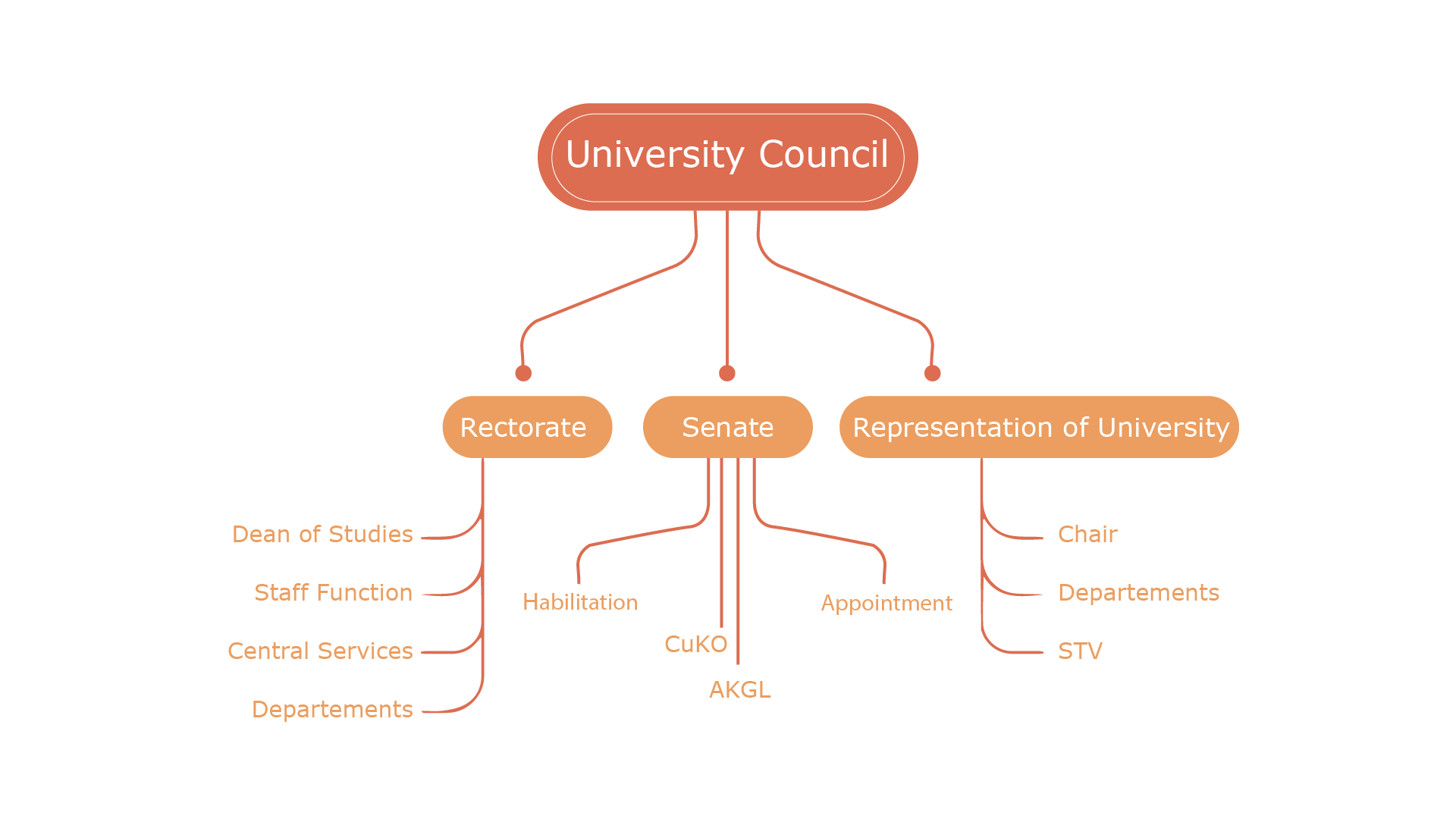General
The basic structure of every Austrian university is anchored in the university act. It is led by three governing bodies: the rectorate, the university council and the senate. Compared to a company, these would equal the management, the board of directors and the general assembly. In the senate (and its subcommittees) are representatives of the students. These are dispatched by the university representatives.

Rectorate
In Leoben, the rectorate consists of the rector and four vice-rectors. The rectorate is administering the university’s business, with each member of the rectorate with its individual area of responsibility.
During the election of the rectorate, the senate is creating a shortlist of three candidates out of all the available candidates. Based on this, the university council is electing the rector. In turn, the rector suggests vice-rectors, which are then approved by the senate and elected by the university council.
- Rector: Univ.-Prof. Dipl.-Ing. Dr.mont. Dr.-Ing. E.h. Peter Moser
- Vice-Rector for Research and Sustainability: Univ.-Prof. Dipl.-Ing. Dr.mont. Helmut Antrekowitsch
- Vice-Rector for Finance and Infrastructure: Mag. et Dr.rer.soc.oec. Barbara Romauer
- Vice-Rector for Marketing and Stakeholder Management: Assoz.Prof. Mag. et Dr.rer.soc.oec. Christina Holweg
- Vice-Rector for Teaching and International Affairs: Univ.-Prof. Dipl.-Ing. Dr.techn. Thomas Prohaska
University Council
The university council is made up of five members. Two of them are elected by the senate and two of them by the Federal Government. These four persons appoint an additional member. The members should be persons who have held responsible positions before or who do so already.
The university council is supervising the work of the rectorate, especially in respect of personnel, finance, long term development and its task also includes lobbying in politics and society in favor of the university. Furthermore, the university approves the annual estimate and closure and changes in the university organigram and development plan, the establishment of associations, arranges labor agreements with the rector and the vice rectors etc. …
- Chairman: Dipl.-Ing. Stefan Pierer
Senate
The senate consists of 26 members and is divided into three Curiae: professors, non-professional teaching staff and students. The Curiae of professors is made up of all tenured university professors, who are heads of a department or an academic chair. The non-professional teaching staff includes all scientific employees (postgraduates, non-tenured professors, lecturers etc…). The professors dispatch 13 members into the senate, non-professional teaching staff and 6 students. An additional member is part of the general university personnel.
The senate makes decisions based on the university statutes, which also consist of the internal regulations for its entities, the study clauses, regulations regarding the elections in the university committees, honors, habilitations etc. …
Furthermore, the senate deploys sub-commissions, elects the Dean of Studies and grants its permission for changes in the Curricula, of the organization- and development plan and the arrangement of the academic year.
In order to fulfill its tasks, the senate deploys sub-commissions. At MU Leoben, these are so called curricula commissions (individually responsible for changes in the curriculum of a field of study), habilitation commissions (conduct of the procedures for the bestowal of the authorization to teach) and an appointments committee (conduct of procedures for the appointment of the heads of departments and institutes). The curriculum commissions are established permanently at the beginning of the term of office of the senate and are made up of 4 professors, 4 representatives of the non-professional teaching staff and 4 students. The habilitation- and appointments committees consist of 5 professors, 2 members of the non-professional teaching staff and 2 students. Appointments committees are made up of 6 professors, 2 representatives of the non-professional teaching staff, 2 students and one external person (professor of another university). The members of the sub-commissions are dispatched by the Curiae.
• Chairman: Univ.-Prof. Dipl.-Ing. Dr.mont. Christian Mitterer
• 1st Vice-Chairwoman: Ass.Prof. Dipl.-Ing. Dr.mont. Tanja Lube
• 2nd Vice-Chairwoman: Marina Auer
• Representative of Curiae of the professors: Lehner, Markus Univ. Prof. Dipl. Ing. Dr.-Ing.
• Representative of Curiae of the non-professional teaching staff: DI Stephan Schuschnigg
• Representative of Curiae of the students: Philipp Zeni
• The members of the senate that are dispatched by ÖH are as follows: Paul Demschar (AG), Philipp Zeni (AG), Johannes Kössler (LLSt), Mirella Meister (VSStÖ), Marina Auer (VSStÖ), Paul Domberger (VSStÖ)
Dean of Studies
1The Dean of Studies is responsible for science and study law, approves the process of crediting university lectures and mandatory internships and coordinates the development of Curricula. In addition, he is responsible for the evaluation of university lectures. A part of his assignments are delegated to the study program commissioners. The Dean of Study is elected by the senate for the duration of 3 years.
Dean of Studies: Univ.-Prof. Dr. Thomas Antretter
Vice-Dean of Studies: Univ.-Prof. Dipl.-Ing. Dr. mont. Gerald Pinter
Council of questions regarding equal treatment
The council of equal treatment has been created by the senate of Mining University of Leoben. Its primary task is to counteract discrimination by university entities due to gender or ethnic affiliation, religion, ideology, age or sexual orientation and to advise and support entities of the university when it comes to these matters. The council of equal treatment has the right of creating a proposal for a plan of the advancement of women and an equality plan.
Chairperson: Dipl.-Ing. Dr. Eva Wegerer, MBA
Members dispatched by ÖH: Sigrid Pichler
Link



